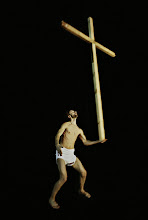by Victoria and Tim Etchells
Queen Elizabeth Hall, Southbank Centre
One of the slightly perturbing elements of Victoria’s That Night Follows Day is its similarities to a Forced Entertainment show. Perhaps normally that wouldn’t matter. We’d accept a certain stylistic similarity - in the ensemble playing style, the use of text, and the performers’ frank audience facing demeanor - via Tim Etchells (artistic director of Forced Entertainment and writer of That Night Follows Day). But, as far as That Night Follows Day is concerned, I am drawn to ask questions about this stylistic similarity because Etchells’ collaborators are all aged between 8 and 14.
This creates a curious doubleness in a show as aware of its constructed and artificial qualities as any ‘grown up’ Forced Entertainment piece. It plays with its fiction and its reality both, with a script not adverse to examining its own premises even as it seems to function as a child to adult telling-it-how-it-is. On the night I saw the show, I felt as if the audience responded more to this second function, with parents audibly chuckling at some revelation of adult behaviour because “I also said (or did) that.” Such audience responses confirmed the script as truth-telling, ignoring or absorbing its self-critical aspects.
Lurking behind all this is the theme of agency, and how much the children are active, empowered explorers of their own lives, and how much they are props in a theatrical work-out. Let’s assume the former (ignoring such complications as how the show was originally performed by a completely different set of children). Then, the connections to Force Entertainment become not a matter of Etchells’ own stylistic influences, but a broader proposition: a certain style of devised, collaborative theatre is not just a way of theatre making, it is a form of radical pedagogy.
This is not, of course, an insight I am deriving from this piece alone. The sense that the techniques and practices of performance art overlap with radical educational theorists such as Paulo Friere and Ivan Illich has been proposed by theorists including Charles Garoian and Yvonne M. Gaudelius, who then look to apply such techniques in the classroom. Their arguments take different forms, but I will focus here on their entwined use of performance and collage, because these terms seem particularly relevant to how the text of That Night Follows Day is functioning:
“Collage enables us to experience everyday life in such a way that its disparate and idiosyncratic fragments resist coalescing into a unifying whole... Instead of a totalizing body of knowledge, the composition of collage consists of a heterogeneous field of coexisting and contesting images and ideas. Its cognitive dissociation provides the perspectival multiplicity necessary for critical engagement. Dialectical tension occurs within the silent, in-between spaces of collage as its fragments, its signifying images and ideas interact and oppose one another. Such complexity and contradiction represent the substance of creative cognition and cultural transformation”.
Part of That Night Follows Day’s strangeness is how the children’s “disparate and idiosyncratic fragments” - the litany of sentences beginning “You tell us...” - become unified by a monolithic, sentimental sense of childhood.
For example, the elements that are most evocative of Forced Entertainment - the use and style of text; the frank, audience facing demeanor - become containers that these child performers can fill, like a constraint or restriction. This frame makes several things possible: it negotiates between the children’s “authenticity” and the demands of a professional performance at the Queen Elizabeth Hall (and elsewhere around the world where the show has toured). It also attempts to enable the sentiment prompted by a group of children onstage to be countered with a distanced, critical and question-raising nonchalance.
But it is impossible to tell from the performance itself whether what we are seeing is the children’s agency or their manipulation by Etchells and Victoria. In such a space of uncertainty, the adaptation of Forced Entertainment’s techniques becomes ventriloquism. Only the children themselves, in their lives beyond the performance itself, know which is which. To think otherwise is to add a nostalgia of performance to a nostalgia of childhood.
SOURCE
Charles R.Garoian and Yvonne M. Gaudelius, Spectacle Pedagogy: Art, Politics and Visual Culture (State University of New York Press, Albany, 2008), 63-4.
David Berridge writes and edits the blogzine More Milk Yvette: A Journal of the Broken Screen. moremilkyvette@gmail.com

.jpg)
No comments:
Post a Comment